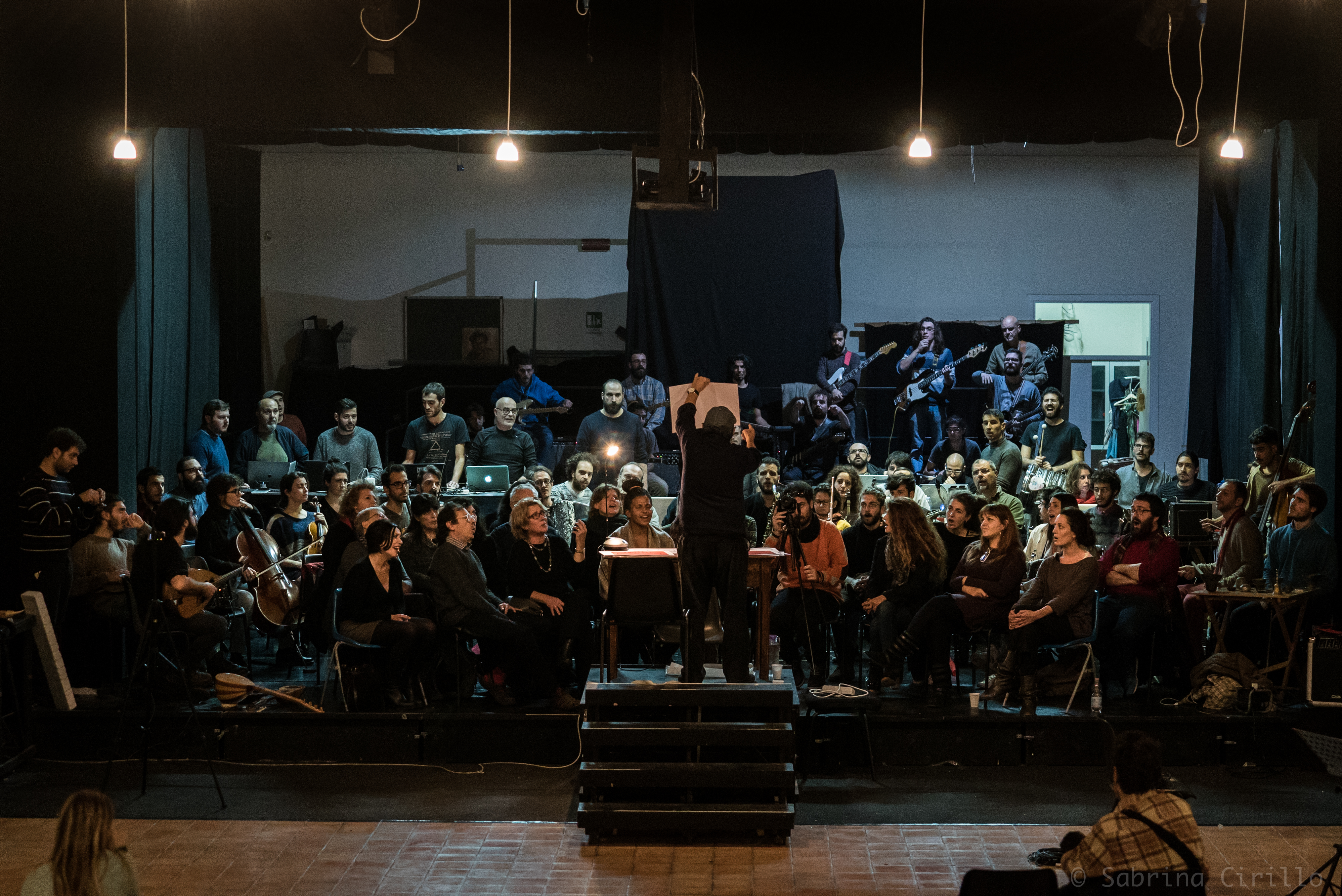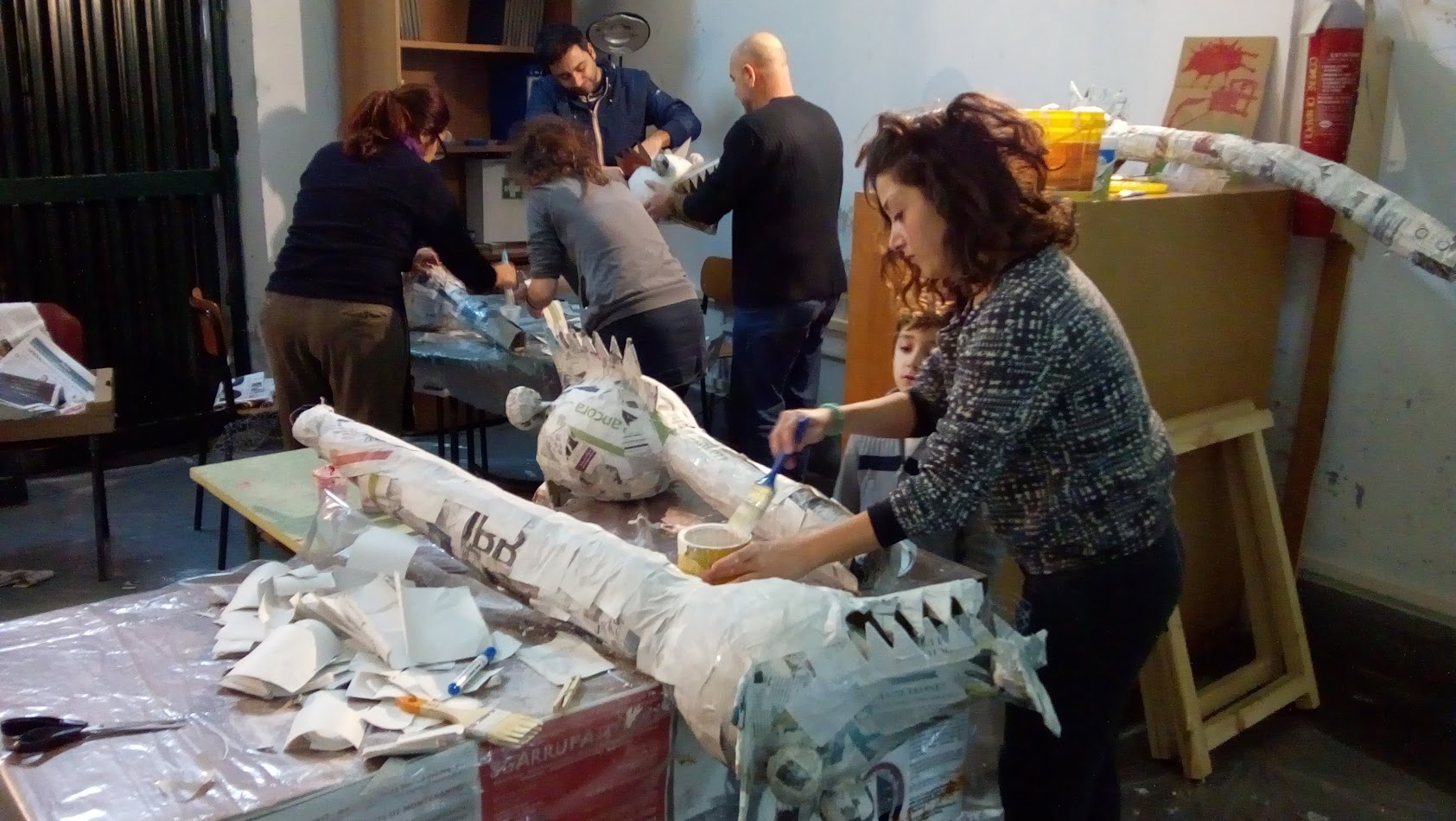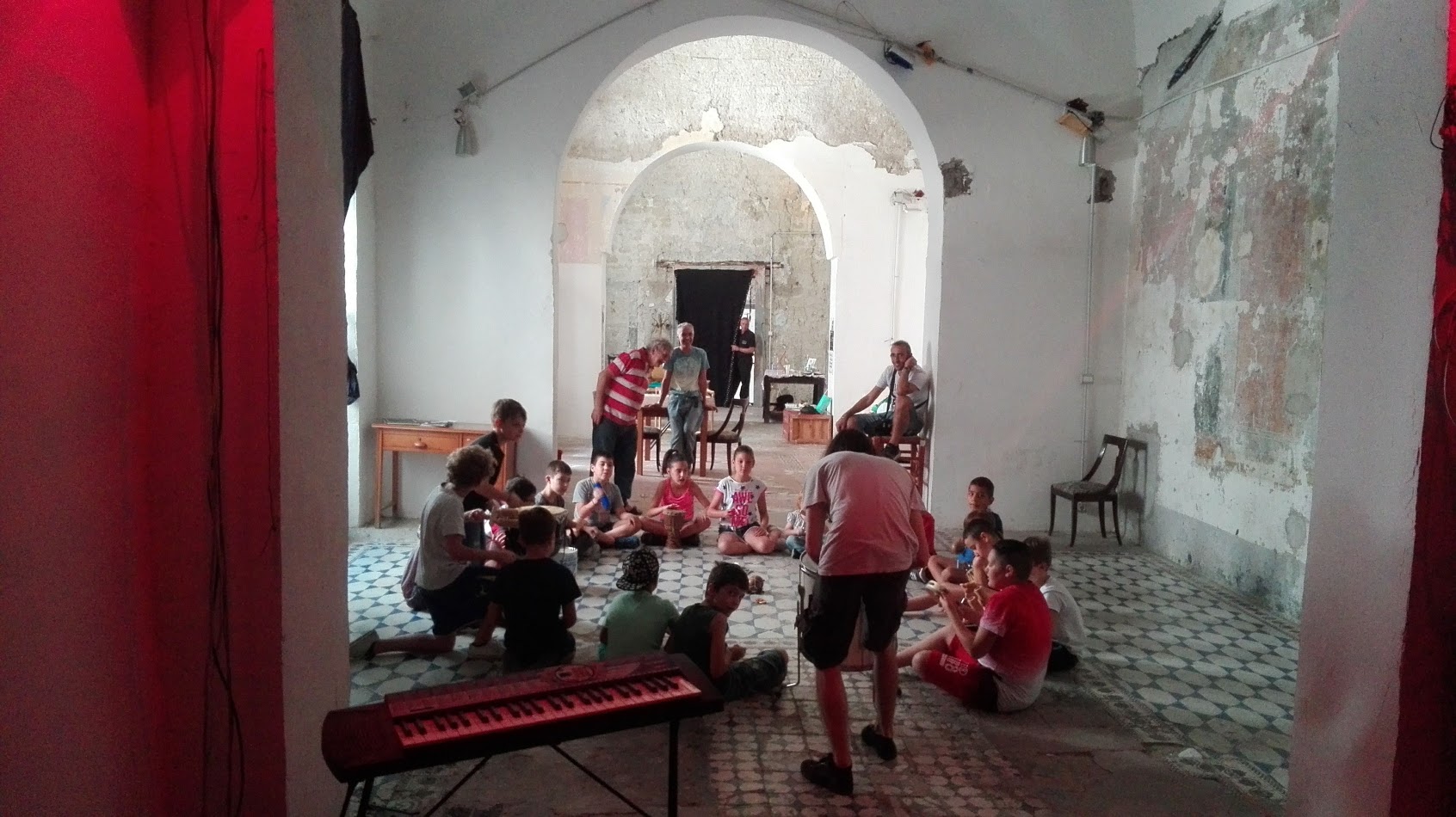Commons towards New Participatory Institutions: The Neapolitan Experience
Edited on
01 December 2020Law scholar and activist Maria Francesca De Tullio describes the genesis of Urban Commons in Naples from 2012 on, with an in-depht examination of the legal innovation that this has entailed.
Opening photo by Sabrina Cirillo

Property and Democratic Participation
Commons and participatory democracy follow, in principle, different logics. Nevertheless, they are getting more and more interlaced with each other due to two converging phenomena. The first one is the politicization of commons. Commons are becoming – in many parts of Europe – a way to rethink political subjectivation by imagining and practising new forms of relation and institutional organization beyond the neoliberal imprint. In other words, political movements are generating ‘emerging common goods’, i.e. commons defined not only by their nature and function but also by their governing, shared between public sector and people. The second phenomenon comes from the opposite direction: the traditional institutions are actively seeking more responsive, accountable, and participatory forms of democracy, to face the distrust towards representatives and electoral mechanisms.
Therefore, there is an opportunity for commons to fill a void of political legitimacy of the institutions. A void which, presently, is also a battleground, for at least two reasons. The first one is that representatives are attempting to put in place weak procedures of participation to gain trust and consent from the citizens without giving away too much power. The second one – and perhaps more important – is that the weakening of elected organisms also leaves room to deregulation, privatization and, thus, inequalities.
Then, the main issue of this study is to use the Neapolitan case, and its challenges, to understand how the public sector can be ‘thin’ against grassroots participation while being ‘fat’ against inequalities. This calls in question public property and spending, as material tools that help to fill the gap between uneven socio-economic positions.
The Neapolitan Experience of ‘Emerging Common Goods’
The path of urban commons in Naples started in 2012, with the occupation of the Ex Asilo Filangieri, a monumental building in the historical city centre, owned by the City of Naples. Occupants were mostly artists who intended to manifest against unemployment and precarious working conditions, as well as against national cultural policies they deemed inefficient and unequal. They attacked a symbol of these policies by grabbing a space that, at that time, had been given in concession to a Foundation in charge of organizing the UNESCO’s Universal Forum of Cultures. The building was considered emblematic, because this kermesse, like many big events, was failing to stimulate all of the artistic texture of the territory. On the contrary, it produced waste of money and a concentration of funding in a few hands.
However, soon the entire city was involved in the process of L’Asilo: cultural workers above all, but also other inhabitants and activists, who were experimenting with new ways to engage in politics. In a series of animated assemblies, they decided not to be ‘occupants’, but commoners. So, they transformed the public spaces in shared and freely accessible means of production, with lower costs and horizontal management, following collaborative rather than competitive logics. Consequently, a creative effort was made to pour that vision into a juridical construction. The aim was not to seek the protection of the law, but to ‘hack’ legality, i.e. to use the disruptive energy of the process to carve the rules and change institutions.
Eventually, they identified this new juridical instrument as ‘urban civic uses’, through an extensive interpretation of the ‘civic use’, a tool that – since ancient times – grants to a certain community collective rights over lands and pastures. But they also brought innovation to this juridical instrument, because they conceived the ‘community’ not in the traditional ‘communitarian’ meaning, but in an inclusive, heterogeneous, and ever-changing sense.
Thus they wrote collectively, in public and open assemblies, a Declaration of Urban Civic and Collective Use (hereinafter Declaration), formally recognized later, in 2015, by two Resolutions of Naples’ City Government. This Declaration rules the use of the spaces of L’Asilo and of the means of production that it contains, ensuring usability, inclusiveness, fairness, accessibility and self-government. The Administration, on its part, by approving the Declaration recognized not only a mere access entitlement but also ‘the rights to the direct administration of the building itself’. The objective of the City Government was not to express tolerance towards the occupation, rather, it was accepting the challenge of transforming juridical science and practices.
Hence, the public domain is not used in an exclusive fashion, nor entrusted to a particular private subject, but opened up to the entire community. Indeed, the administration of the spaces, consistent with their nature of common goods, is undertaken by Governing and Management Assemblies that are open to everyone (not only citizens and adults) and decide by consensus (Declaration, Art. 3). Moreover,
the overriding principle in the programming of activities is the non-exclusive use of any part of the property, as turn-taking and the guarantee of use, access and usability of the space by the parties who benefit is the guiding principle of the whole urban civic use system (Declaration, art. 14).
In practice, the building was transformed in an ‘interdependent’ centre of artistic production, which has been crossed – in the first five years – by over 2,400 productive subjects, 7,800 public initiatives, and 260,000 beneficiaries. Anyone who wishes to employ the space to work, rehearse, or organize civil, political, and cultural initiatives only needs to propose the activity to the Management Assemblies. These do not exercise an artistic direction, but, as to the contents, only refuse fascist, sexist, and racist proposals. Yet, as requests grow in number, and spaces and energies remain limited, the community constantly engages in reasoning, to elaborate choosing criteria consistent with the destination of the building.
With this participatory establishment the Administration does not abandon its responsibilities. Indeed, by recognizing the Declaration, the City government binds itself to very precise commitments:
The City Administration … provides, within the limits of the available resources, the management expenditures and what is necessary to ensure adequate accessibility to the property. It also provides what is necessary to ensure a safe environment for carrying out the activities and the protection of the property by preventing damages by vandalism. (Art. 20)
Not last, ‘City Administration undertakes to intervene in any case ensuring access to and use of the spaces according to the scheduled activities’. These public expenses are justified through the recognition of the ‘civic redditivity’ of the experience, i.e. the ability of the commons to generate a social non-monetary value which is worth the expense of maintaining the building. That way, a piece of real estate became, through the collective will, an ‘emerging common good’, getting to represent not only a platform of mutualism for workers in the field of arts and culture but also an incubator for democratic participation.
Afterwards, the same path has been followed in favour of seven more spaces, which have been declared common goods in a new Resolution in 2016. Namely, these spaces are Villa Medusa and ex Lido Pola, in the suburban area of Bagnoli, together with ex Schipa, ex Opg (Psychiatric Criminal Hospital), Giardino Liberato (Freed Garden), Ex-conservatory of Santa Fede, and former juvenile prison Filangieri, now called Scugnizzo Liberato, in the area of the historical city centre. All of them have their own characteristics and vocation, but they share the same engagement to remain self-governed and accessible to everyone.

OblaFest festival at Santa Fede Liberata, Naples, May 5, 2018
A Legal Frame for Commons and Participation: Not a ‘Small Government’, but a More Open One
As shown in the brief description above, through commons the Neapolitan Administration has responded to regulatory dilemmas – such as art and culture policies, or urban planning and environment – by loosening its hierarchical power and giving up a proprietary interpretation of the public domain. In doing so, it adopted a new view of the administrators/administered relations.
Surely, there is a broader trend in the evolution of the Public Administration, seeking to shorten the distance between government and stakeholders by building nearly-horizontal structures and procedures of intersection and interrelation. The reasons for this movement are similar to the reasons that – we can assume – moved the Neapolitan Administration: involving civil society in rule-making ameliorates the reasonableness of the rules in light of the logics of the sector, increases the possibility to acquire knowledge, experience, and competence from the people, allows a quick update and entails a lower enforcement effort because everyone is more likely to respect the rules that they have themselves created. However, such decisional powers usually are – except for a few anomalies – a privilege of corporations, which have the strength to influence governmental mechanisms.

Composer Alvin Curran and his improvised orchestra at l'Asilo, Naples, November 25, 2017, ph by Sabrina Cirillo
Naples is one of these anomalies because participation and public domain are progressively vindicated as a ground where government shall open itself to self-government and collective use. Hence, this path is different from the traditional participatory democracy, which does not really question the representatives’ discretion, but also from the neoliberal order, which in facts legitimates the prevailing of the strongest. Indeed, policy-making has not merely been opened up to everyone, regardless of who ‘everyone’ is. Instead, to gain a really broad inclusion, active and selective measures have been taken by the public sector to support the participation of poor, precarious, and marginalized subjects. Hence, this experiment is not a deregulation, because the Administration keeps intervening in the socio-economic field. The public sector does not withdraw but becomes an elastic net: the scope of its action is expanded, while its texture becomes wider and more porous to contributions by people. In concrete terms, Naples’ City Government does not provide pre-packaged social services or civic platforms but delivers to the have-nots the means for self-organization of production and democratic participation. Something that the haves can already access by virtue of private capitals.
These regulatory novelties move within the Italian Constitution and implement it through political conflict. In particular, the goal is to concretize the core value of ‘substantial equality’, stated in Article 3.2 of the Constitution:
It is the duty of the Republic to remove the economic and social obstacles that by limiting in fact the freedom and equality among citizens impede the full development of the human person and the effective participation of all workers in the political, economic, and social organization of the Country.
This rule is an obligation for the future and means that formal legal equality is not enough, and the State is bound to enact selective and positive support to overcome the uneven distribution of wealth and opportunities among workers. And precisely in that sense, commons are an implementation of the Constitution: not an undisputed interpretation, but a struggle to ‘take equality seriously’. In this same way, the Italian Constitution fully admits and promotes self-government. Indeed, not only does it ensure collective rights, such as the freedom of assembly and association, but it goes even further. Article 49 states the right to ‘concur in accordance with a democratic method to determine the national politics’, not only in the elections. More importantly, Article 118.4 regulates the hypothesis in which civil initiatives go beyond the exercise of freedoms and overlap with public responsibilities, because they share the same commitment to the general interest. Namely, the rule imposes that public entities ‘favour the autonomous initiative of citizens, individual or associated, for the undertaking of activities of general interest, on the basis of the subsidiarity principle’.
Here, the struggle is to connect the verb ‘to favour’ with the already mentioned Article 3.2, interpreting it as an obligation of the Administration to not only avoid interferences with civil organizations, but also help—with funding, spaces, tools, or organizational support—the grassroots initiatives that mobilize themselves to pursue a general interest but cannot afford it.
So, when the government finds that the spontaneous initiatives are not able to fully cover a general need, the answer is not to direct power towards an authoritative level, but to first support the initiative. Otherwise, Article 118.4 would violate the basic principle of substantial equality, because it would empower only those who have enough resources to conduct an autonomous initiative (for example, run an artistic production centre on their own). In other words, the principle would be a key to legitimize the privatizations of social services, because enterprises are the only ones who can afford to deliver an efficient product. This is also a risk in many hypotheses related to the ‘pacts of shared administration’ originated by the 2014 Regulation of Bologna on the collaboration Between Citizens and Administration for the Care and Regeneration of Urban Commons: if there is no clear assumption of responsibility by the Administration, the risk is to ‘empower the already empowered’.
Instead, through Neapolitan commons the City provides the people with means to exercise what has been defined as ‘direct administration’. This expression was used because, as mentioned, activities of general interest overlap with the sphere of public power. To be sure, the Assemblies do not hold the same power as the Administrations, because the first ones cannot use coercion and force (to that aim, a law would be necessary); moreover, the public sector maintains the discretion to change the regime of the good. However, the community is entitled to rule the access to public property and social services, and this is still an important factor, because – as is explained below – supplying welfare is a form of power, even if a non-coercing power.
So, in this instance, what is normally an exclusive privilege of strong corporations is available to all, citizens and non-citizens, without subjective limits. This grants more legitimization to self-regulation, given that – as a general principle – the reason why legal rules stemming from civil society cannot be binding for all is especially that not every affected person participates in their drafting.
The experimentation places itself in the framework of Article 42 of the Italian Constitution, which requires the property to be consistent with its ‘social function’, i.e. to be regulated so as to give priority to collective personal rights, in confrontation with individual economic freedoms. However, the actual regime of property – and private property above all – is intrinsically hindering social function, because it leaves few alternatives to absolute and exclusive ownership. Therefore, it makes it impossible, even for the ‘things that express utilities functional to the exercise of fundamental rights, as well as the free development of the person’, to ‘ensure[d] their collective enjoyment’ (as written by the Rodotà Commission in 2007). Also, in this case, the implementation of the Constitution has a controversial path, running between the universality of human rights, stated in Article 2, and the very narrow interpretation that the Italian Constitutional Court gives of Article 42, which is more in favour of property.
In conclusion, the Neapolitan example has set a regulatory establishment, legitimized by the Constitution (especially Articles 2, 3, 118, 42, and 43), in which the Administration is not the citizen’s ‘agent’ any more. Rather, public power helps the inhabitants while they become ‘their own’ agents. This arrangement is still radically incompatible with neoliberal deregulation and privatization, at least for some basic elements, such as integral accessibility of self-government organisms, selective public provision of spaces, and funding to weak grassroots movements, and constant questioning of property, which impedes any exclusive use or exclusive profit of a public good.

Carnival workshop at Sgarrupato, Naples, February 3, 2018
New Modalities of Political Participation and Welfare in the Age of the Crisis
All the characteristics highlighted before make it difficult to describe an ideology or even a unitary idea behind the Neapolitan experience of commoning. Indeed, it is a still ongoing movement, based on a constant questioning of property and relations with state and market.
It is also a variegated reflection, combining many issues and ideological provenances. Indeed, no open community, despite undertaking a political action, constitutes a political collective or subject or holds uniformity in views and actions. Rather, they share an agreement upon some basic visions and battles. The effect of entering a heterogeneous assembly and build consensus in it, is that pre-existing opinions and ideologies have to be disarticulated and confronted with new questions and decisions so that new political aggregations become possible. This mechanism has been defined as a ‘chain of equivalence’, because it can create common actions among people and interests that usually intersect different planes. However, the most important stake of the ‘chain’, here, is not to build a collective identity – seeking a representation of the unrepresentable, through a discursive operation – but to engage in a long-term reflection about how to shape political actions, responding to the new features of capitalism and neoliberalism.
This is especially true for L’Asilo. Although it is a highly politicized space, in the Declaration electoral campaigns are excluded from the activities allowed. This does not mean that there can be no discussions with parties. Common goods have multiplied the spaces for democratic debate and have been incubators for different new political entities. However, the statement in the Declaration intends to avoid the space being occupied by a single political subject, thus losing its heterogeneity.
That given, someone would include such experimentation in a paradigm of deliberative democracy, because it transforms the initial preferences of the individuals while avoiding negotiations and strategic behaviour. Still, there are some main differences, because the focus is not on an exchange of information and arguments where participants are committed to the values of rationality and impartiality. By contrast, there is a strong dialectic of ideas in the commoning process, and the whole movement is an act of conflict against the current power relations and socio-economic status quo. So, the rational side is not the only relevant one, even for technical choices. Indeed, consensus does not pursue reasonableness, but the care of relations and extirpation of dynamics of racism, sexism, bullying, and violence.

Music workshop for kids at Santa Fede Liberata, Naples, Jun 19, 2018
In short, urban commons in Naples are a constant research of new ways to counter privatizations and boost self-government logics by multiplying participatory institutions such as, for example, inhabitants’ assemblies and civic observatories or audit processes. Thus, the effectiveness of this movement is measured by the change they can produce in the institutional structure and language.
In particular, one of the hardest undertakings is the creation of pathways to rethink welfare in times of crisis and austerity.
As mentioned, public spending is essential to equality and, consequently, democracy; nevertheless, budget constraints, at every level, are progressively inhibiting egalitarian and social policies. Hence, on the one hand, there is the struggle for the recognition of the ‘civic redditivity’. Indeed, in many local realities budget limitations are a reason, or an excuse, to alienate and privatize public goods, instead of making them available for the common enjoyment. In that sense, a question emerged about how to calculate the social and cultural value generated by an experience, to make this value emerge as something that can compensate, and sometimes exceed, the purely monetary loss. On the other hand, a broader reflection is taking place with regards to public debt. Recently, a document from “Massa Critica” – a joint platform for action and reflection within the movement of the common goods – advocated the abolition of the Fiscal Compact and the institution of a public audit commission on public debt, in charge of
shed[ding] some light on the genesis of the debt, on the mechanisms that generate it at present and that strengthen it through the indefinite loop of the austerity policies, on the technical parameters of the loans and active interest rates burdening the Comune di Napoli (Municipality of Naples), on the legitimacy of each and every part of it, with the aim of understanding which sections are hateful and illegitimate and therefore will not be paid.
Moreover, an imaginative effort is needed to use commons to rethink welfare through mutualism. Indeed, public welfare as it is disciplines society, because it encourages certain choices and discourages others. It enhances the buying power, and therefore consumer spending, but does not solve the basic disparity given by the ownership of means of production. In that sense, commons are instead a way to gain both autonomy and access to shared means of production. Although, as mentioned, it would probably be utopian to imagine a total autonomy of these mutualistic forms, because they would be erased by more competitive market economies. So, the constant question mark of commoning experiences is how to imagine a systematic public intervention in the economy that eliminates the roots of the inequality and supports mutualistic experiments without trapping them in a heteronomous order. Given that, perhaps it is no coincidence that the movement started in the field of art and culture.
Indeed, independent artistic expression, exactly like grassroots political debate, is a heterogeneous civic and cultural reality, intolerant of rigid rules, but at the same time precarious and vulnerable, in need of being protected from the competitive and normalizing the logic of markets. In addition, in that sector, the contradictions of the proprietary model arise sharply, because intellectual property creates a conflict between, on the one hand, free accessibility of knowledge and, on the other hand, the workers’ rights. This calls for a creative mix of public policies and mutualistic practices, able to foster and sustain the spontaneous emergence of cooperation mechanisms.
In synthesis, the Neapolitan experimentation with commons has contaminated the Administration with new languages and procedures, characterized by the complete accessibility of self-government organisms, the selective public provision of spaces and funding to weak grassroots movements, and constant questioning of property and exclusive use.
A further question, then, from both a legal and political point of view, is to imagine how these tools can be useful in other realities and territories, where other commons are emerging. Here, the hardest challenges, besides the political ones, derive from the crisis of public debt, which increases the pressure towards privatization and clearance sale of public goods.
* * *
This article is a slightly shortened version of a paper – lightened by the bibliography and academic references – published in the collection of essays Exploring Commonism – A New Aesthetics of the Real, edited by Pascal Gielen and Nico Dockx (Valiz, 2018). You can get the original text with all the references here.
 Submitted by Gregorio Turolla on
Submitted by Gregorio Turolla on
